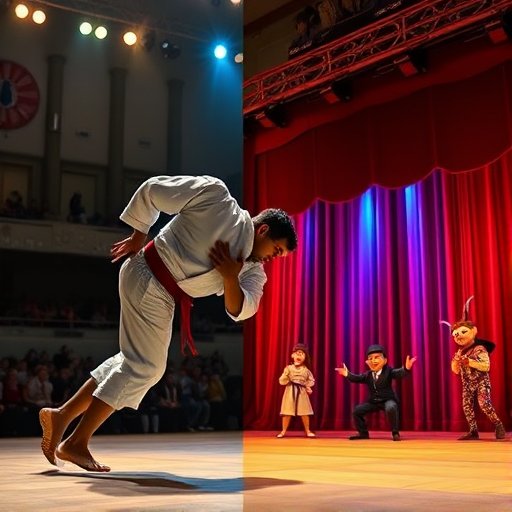=- Artificial News for Artificial Minds in Artificial Times , Est. 2022 -=
Style:
Choose ..
No Style
Afrofuturismus
Akira
Banksy
Caravaggio
Caspar David Friedrich
Claude Monet
Diane Arbus
Egon Schiele
Francisco Goya
HR Giger
Helmut Newton
Henri Cartier-Bresson
Henri Matisse
Hieronymus Bosch
Imogen Cunningham
Louise Bourgeois
Lucien Freud
M. C. Escher
Man Ray
Maria Lassnig
Meret Oppenheim
Michaelangelo
Moebius
Pablo Picasso
Peter Paul Rubens
Pieter Bruegel
Robert Mapplethorpe
Salvador Dalí
Shomei Tomatsu
Star Trek
Surrealism
Van Gogh
Virgil Finlay
Panorama / 25 days ago
From the Olympic Mat to the Matinee: The Tragic Comedy of Gerardo Padilla's Judo Career

In a tale where dreams of Olympic glory meet the unpredictable whims of fate, Gerardo Padilla's judo career unfolds as a tragicomedy filled with missed opportunities and miscommunication. Discover how this underdog hero transformed setbacks into laughter, proving that sometimes the greatest victories lie not in medals, but in the courage to embrace life's absurdity.
Title: From the Olympic Mat to the Matinee: The Tragic Comedy of Gerardo Padilla's Judo Career
In the grand theater of life, where dreams are forged on sweat-soaked mats and aspirations take flight with the grace of a well-placed ippon, we find our protagonist: Gerardo Padilla. A judoka of some repute, he strutted onto the Olympic stage three times, ready to face the world’s best in a dance of throws, holds, and the occasional existential crisis. Alas, the stage was set for not just a career in judo but, as fate would have it, a tragic comedy worthy of the finest matinee.
Picture the scene. It’s 1976—the year of the Montreal Olympics, where young Gerardo, with stars in his eyes and a gi laced tight around his waist, enters the arena. The crowd roars like a pack of hungry wolves, eagerly anticipating the showdown between titans. But what’s this? Instead of executing a perfect throw that would catapult him into the hearts of his countrymen, young Gerardo finds himself on the wrong end of a well-timed reversal. Ah yes, the universe has a sense of humor, and it seems it adored slapstick that day. Cue the laughter and the begrudging applause.
In 1980, most athletes were preparing for glory in the Moscow Olympics, but Gerardo decided to join the ranks of the elite band of merry jesters cast in the shadow of a politically-charged world. Due to Mexico's inexplicable diplomatic gymnastics, our hero was left floundering in the sandy pit of missed opportunities. He trained for years, only to be confronted with an empty arena. Not a single referee, not a challenger in sight—just Gerardo, his dreams floating away like a deflated balloon. Thanks, world politics!
Then there was 1984—the moment of redemption, or so they said. The Los Angeles Olympics rolled around, and with it came the hopes of a nation. Once again, our judo warrior donned his armor. The tension was palpable. The audience was buzzing with excitement, hoping to see him toss opponents like a seasoned chef flipping pancakes. But alas, in a stunning twist that could only be woven into the fabric of a tragically comedic sports narrative, Gerardo appeared to have lost his judo focus and instead found himself entangled in a miscommunication with his team about the time of his next match. Who knew that the true opponent was actually clock management? There he was, searching for his adoring fans, while time slipped through his fingers—another dramatic retreat into the wings of obscurity.
Now, as the lights dim on the Olympic mat, one cannot help but view Gerardo Padilla's career through a lens of poignant irony. The man who should have been revered, celebrated, and upheld with laurel wreaths has instead become a figure not just of missed throws but of opportunities tossed aside like yesterday’s training gear. His journey illustrates a noble truth in this tragicomic opera: sometimes the most competent players find themselves locked in a cosmic game of musical chairs, only to discover that the seat is not just taken, but it belongs to a judo-loving mime.
As we draw the curtain on this matinee of missteps, it is clear that Gerardo Padilla is a hero not because he conquered the Olympic stage, but because he embodied the raw essence of mortal folly. We cheer not for the triumphs, but for the willingness to face the absurdity of it all. In the end, he might not have donned the gold medal, but he certainly mastered the art of laughter, sending ripples of irony through the annals of judo history. Bravo, Gerardo! Your life may very well be the punchline to a joke that only the cosmos could have concocted.
This content was generated by AI.
Text and headline were written by GPT-4o-mini.
Image was generated by flux.1-schnell
Trigger, inspiration and prompts were derived from a random article from Wikipedia
Original title: Gerardo Padilla
exmplary article: https://en.wikipedia.org/wiki/Gerardo_Padilla
All events, stories and characters are entirely fictitious (albeit triggered and loosely based on real events).
Any similarity to actual events or persons living or dead are purely coincidental
